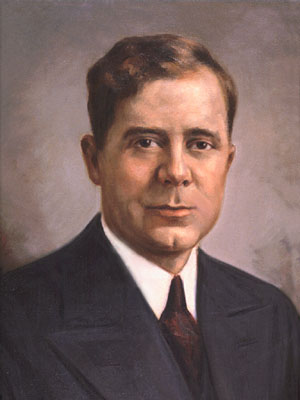“High Popalorum”
or
“Low Popahirum”

Louisiana’s greatest and worst governor, Huey Pierce Long, was killed by President Franklin Delano Roosevelt to keep him from becoming President. (That’s what the docent at the Louisiana State Capitol told my Boy Scout troop in my presence! She also threw out something about Standard Oil, too, but who was I to take issue with an elderly lady?) Undoubtedly, President Roosevelt was politically threatened by Senator Long’s “Share-the-Wealth” program, but I find it hard to believe that he was behind Mr. Long’s assassination.
When “The Kingfish” was asked to
give a comparison of the Republican and Democratic Parties, he would tell
the story about a traveling salesman who offered two patent medicines. One
was “High Popalorum,” which was taken from the bark of a tree from the
top down. The other tonic was “Low Popahirum,” which was taken from
the bark of a tree from the bottom up.
Governor Long said, “The only difference I’ve found in Congress
between the Republican and Democratic leadership is that one of them is
skinning us from the ankle up and the other from the ear down.”
Governor Long’s comments made me
think of some of America’s more recent Presidents’ statements.
President Richard Milhous Nixon in
1973:
“I have earned every cent. And in all of my years in public life I have
never obstructed justice. People have got to know whether or not their
president is a crook. Well, I’m not a crook.”
President William Jefferson Clinton
in 1998:
“Now, I have to go back to work on my State of the Union speech. And I
worked on it until pretty late last night. But I want to say one thing to
the American people. I want you to listen to me. I’m going to say this
again. I did not have sexual relations with that woman, Miss Lewinsky. I
never told anybody to lie, not a single time—never. These allegations
are false. And I need to go back to work for the American people.”
When I think of these and other
American Presidents, I’m reminded of what President Theodore Roosevelt
said in 1918:
“To announce that there must be no criticism of the president, or that
we are to stand by the president, right or wrong, is not only unpatriotic
and servile, but is morally treasonable to the American public.”
I also remember President Dwight D.
Eisenhower’s warning a short time before he left office, back in 1960:
“In the councils of government, we must guard against the acquisition of
unwarranted influence, whether sought or unsought, by the
military-industrial complex. The potential for the disastrous rise of
misplaced power exists and will persist.
“We must never let the weight of
this combination endanger our liberties or democratic processes. We should
take nothing for granted. Only an alert and knowledgeable citizenry can
compel the proper meshing of the huge industrial and military machinery of
defense with our peaceful methods and goals, so that security and liberty
may prosper together.”
However, even if some of our leaders
have been thieves or worse, I am cautioned and comforted by Daniel 4:17
(4:14 in Aramaic.):
“This matter is by the decree of
the watchers, and the demand by the word of the holy ones: to the intent
that the living may know that the most High ruleth in the kingdom of men,
and giveth it to whomsoever he will, and setteth up over it the basest of
men.” (KJV)
“The decision is announced by
messengers, the holy ones declare the verdict, so that the living may know
that the Most High is sovereign over the kingdoms of men and gives them to
anyone he wishes and sets over them the lowliest of men.” (NIV)
This passage, like Romans, affirms
God’s sovereignty over politics. But
there is another truth that is brought out in the angelic revelation to
Nebuchadnezzar, King of Kings, and that is that God’s choice is
generally not of paragons of virtue or the crème de la crème of
humanity. On the contrary,
God often exalts wretched people to power. Consider Daniel’s choice of the Aramaic word, SH’PHaL;
here are several lexical definitions:
(1)”lowly” William L. Holladay, A
Concise Hebrew and Aramaic Lexicon of the Old Testament.
(2) “wretched,
humble, lazy; low, lowest” Ludwig Koehler and Walter Baumgartner, Lexicon
in Veteris Testamenti Libros.
(3) “ordinary
people, i.e., ones not of noble or royal class, implying a class of
persons lacking resource, formally, the lowliest of humankind” James
Swanson, (Louw-Nida) Dictionary of Biblical Languages With Semantic
Domains: Aramaic (Old Testament).
That is part of the irony in the
revelation to Nebuchadnezzar. Though
he was the son of Nabopolassar, the founder of the Neo-Babylonian Empire,
and though he viewed himself in the grandest terms, as is seen in the
passage below, yet he is a nobody, no better than the lowest slave from
the lowest subjugated people of the Empire.
For all his sense of self-worth and importance; he is not superior
to the illegitimate child of a Babylonian prostitute.
“At the end of twelve months he
was walking on the roof of the royal palace of Babylon, and the king said,
‘Is this not magnificent Babylon, which I have built as a royal capital
by my mighty power and for my glorious majesty?’
While the words were still in the king’s mouth, a voice came from
heaven: ‘O King Nebuchadnezzar, to you it is declared: The kingdom has
departed from you! You shall be driven away from human society, and your
dwelling shall be with the animals of the field. You shall be made to eat
grass like oxen, and seven times shall pass over you, until you have
learned that the Most High has sovereignty over the kingdom of mortals and
gives it to whom he will.’” (Daniel 4:29-32)
We should not be surprised, then,
when politicians do great evil—God sets over us the basest of men—but
their manifestations of human depravity do not warrant our chortling with
glee over their fall, nor our holding them in contempt, railing in
judgment against them. On the
contrary, we should remember the warning:
“In the very same way, these dreamers pollute their own bodies,
reject authority and slander celestial beings.
But even the archangel Michael, when he was disputing with the
devil about the body of Moses, did not dare to bring a slanderous
accusation against him, but said, ‘The Lord rebuke you!’” (Jude 8,
9.)
